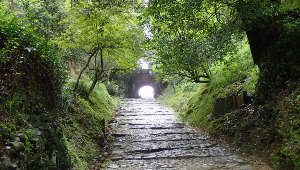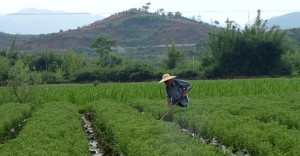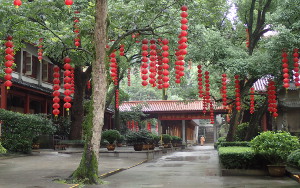
Tang dynasty infrastructure, 1300 years on: the Mei Pass

Stevia farming in Jiangxi

The Fa Xi temple in Hangzhou
 Tang dynasty infrastructure, 1300 years on: the Mei Pass |
 Stevia farming in Jiangxi |
 The Fa Xi temple in Hangzhou |
Apollo Asia Fund's NAV rose by 9.9% in the second quarter, to US$2,231.09, slightly above the previous peak set in 2014. The 23% gain in NAV in the first half of 2017 reflected a 22% gain in the MSCI Far East ex-Japan index. We also gained a notch from the foreign premium on sale of our stake in Vietnam's Phu Nhuan Jewelry, after taking an immediate markdown at the time of purchase (see 3Q16 report) when we paid a premium to buy in.
| Geographical
breakdown by listing; 30 Jun 17 |
% of assets |
| Hong Kong | 22 |
| India | 7 |
| Indonesia | 4 |
| Japan | 8 |
| Malaysia | 8 |
| Singapore | 4 |
| Thailand | 14 |
| Vietnam | 12 |
| Other | 9 |
| Net cash & receivables | 13 |
| Rounding adjustment | -1 |
100 |
We parted company in 2Q with four of our holdings, including some which had done very well for us over the years but no longer seemed quite so promising. We are patient with companies which are having short-term difficulties - perhaps to a fault, but when managers respond to each setback with sensible steps, the results are usually good in the end, and we sometimes learn more about the business characteristics during such periods. When our confidence dwindles, however, we pay more and more attention, and may trim; if it is lost, we try to exit completely, rather than trying to be too clever about the price. As luck would have it, all of the sales in this quarter were at prices which made us reasonably happy, but when confidence is lost we often curse and sell anyway.
Political shocks continued. Several countries moved further towards authoritarianism¹, Jakarta's popular and effective governor was jailed on charges of blasphemy, the ongoing battle for Marawi should have dispelled any complacency about Daesh in Southeast Asia, and it was made clear to Hong Kong what China thinks of the Joint Declaration.
One of the most remarkable changes over the last year is the speed with which China has strengthened its strategic position, with the construction and fortification of South China Sea islets; a tightening grip on expression at home; influence over enough individual governments to have neutralised ASEAN as a political force; and at-least-provisional agreements for huge investments in ports, pipelines and other strategic assets in countries such as Sri Lanka and Pakistan.
I was therefore particularly grateful to have the opportunity to talk to businessmen from Pakistan and Bangladesh as well as Sri Lanka at CT-CLSA's excellent conference. The Pakistanis present seemed unanimously positive on the ambitious plans for the China-Pakistan Economic Corridor, although these plans are not without critics; they were positive not only on the business opportunities, but on a crackdown on street crime credited to Chinese pressure, and on promises of an end to chronic power and water shortages.
Colombo is in a construction boom, startling even by Asian standards. Leafy streets have disappeared, and a giant dredge is scouring the seabed off Galle Face Green to reclaim land for the new Financial City. Colombo is a transhipment hub for the subcontinent and has long had the potential to become a service centre too. The hope is that the new buildings will be transformative², but it seems doubtful that they are necessary, and the costs of such construction-led growth are high even if uncounted. The vast building sites are said to be operated largely by Chinese labourers and managers, and for rapid landscape remodelling their skills must be unparallelled - but benefits to the local workforce are thus limited, and the costs of disruption, pollution, and rising cost of living, along with the liabilities incurred by the government, and any inequities of land acquisition, fall on local residents. The current government has good intentions, and inherited a very difficult hand³. Its challenge will be to deliver benefits to the people before the next election comes due.
An overland trip from Guangzhou to Hangzhou included two new megacities, quite apart from the sprawl of the old ones, and I wonder about the wisdom of building so extensively over prime agricultural land. However, the farmers supplying stevia to PureCircle appear to be prospering, Jiangxi's universities and technical colleges are doing a good enough job that the company's many engineers and agronomists are locally recruited, and young people seem optimistic about their studies, training, and career hopes. The opportunities for today's graduates are vastly better than those open to their parents or grandparents - which may no longer be true in all other Asian countries - but the one concern mentioned by several was for the wellbeing of elderly relatives displaced from their land without adequate healthcare or pensions. Foreign travellers seemed scarce: Asians may blend in, but I noticed only three laowai in ten days, among probably a hundred thousand people after nine visits to railway stations. There is so much to see, and the world's greatest transformation story is surely of interest... Are westerners being deterred from travel by the propaganda of our own governments? Or unwilling to go without Winnie the Pooh? Perhaps there's a seasonal explanation, but there's plenty to keep on your wishlists.
Claire Barnes, 18 Jul 2017
| Home | Investment philosophy | Fund performance | Reports & articles | *What's new?* |
| Why Apollo? | Who's Claire Barnes? | Fund structure | Poetry & doggerel | Contacts |